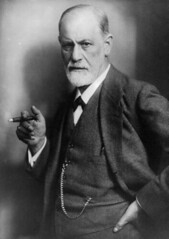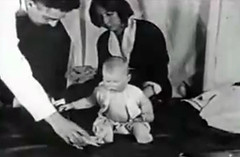Important people in AP PSychology
| 9820178795 | Sigmund Freud | 1856-1939; Field: psychoanalytic, personality; Contributions: id/ego/superego, reality and pleasure principles, ego ideal, defense mechanisms (expanded by Anna Freud), psychoanalysis, transference |  | 0 |
| 9820178796 | Anna Freud | 1895-1982; Field: psychoanalysis; Contributions: focused on child psychoanalysis, fully developed defense mechanisms, emphasized importance of the ego and its constant struggle |  | 1 |
| 9820178797 | Carl Jung | 1875-1961; Field: neo-Freudian, analytic psychology; Contributions: people had conscious and unconscious awareness; archetypes; collective unconscious; libido is all types of energy, not just sexual; Studies: dream studies/interpretation |  | 2 |
| 9820178798 | Erik Erikson | 1902-1994; Field: neo-Freudian, humanistic; Contributions: created an 8-stage theory to show how people evolve through the life span. Each stage is marked by a psychological crisis that involves confronting "Who am I?" |  | 3 |
| 9820178799 | Lawrence Köhlberg | 1927-1987; Field: cognition, moral development; Contributions: created a theory of moral development that has 3 levels; focuses on moral reasoning rather than overt behavior |  | 4 |
| 9820178800 | Carol Gilligan | 1936-pres; Field: cognition; Contributions: maintained that Köhlberg's work was developed by only observing boys and overlooked potential differences between the habitual moral judgments of boys and girls; girls focus more on relationships than laws and principles |  | 5 |
| 9820178801 | William James | 1842-1910; Field: functionalism; Contributions: studied how humans use perception to function in our environment; Studies: Pragmatism, The Meaning of Truth |  | 6 |
| 9820178802 | William Wundt | 1832-1920; Field: structuralism: research on workings of senses; applied scientific method to psychology; used Introspection Studies: 1st psychological laboratory in world at University of Leipzig |  | 7 |
| 9820178803 | BF Skinner | 1904-1990; Field: behavioral; Contributions: created techniques to manipulate the consequences of an organism's behavior in order to observe the effects of subsequent behavior; Studies: Skinner box |  | 8 |
| 9820178804 | John B Watson | 1878-1958; Field: behaviorism; Contributions: generalization-inductive reasoning, emphasis on external behaviors of people and their reactions on a given situation; Studies: Little Albert |  | 9 |
| 9820178805 | Jean Piaget | 1896-1980; Field: cognition; Contributions: created a 4-stage theory of cognitive development, said that two basic processes work in tandem to achieve cognitive growth (assimilation and accommodation) |  | 10 |
| 9820178806 | Harry Harlow | 1905-1981; Field: development; Contributions: realized that touch is preferred in development; Studies: Rhesus monkeys, studied attachment of infant monkeys (wire mothers v. cloth mothers) |  | 11 |
| 9820178807 | Carl Rogers | 1902-1987; Field: humanistic; Contributions: founded person-centered therapy, theory that emphasizes the unique quality of humans especially their freedom and potential for personal growth, unconditional positive regard, fully functioning person |  | 12 |
| 9820178808 | Abraham Maslow | 1908-1970; Field: humanism; Contributions: hierarchy of needs-needs at a lower level dominate an individual's motivation as long as they are unsatisfied, self-actualization, transcendence |  | 13 |
| 9820178809 | Karen Horney | 1885-1952; Field: neo-Freudian, psychodynamic; Contributions: criticized Freud, stated that personality is molded by current fears and impulses, rather than being determined solely by childhood experiences and instincts, neurotic trends |  | 14 |
| 9820178810 | Alfred Adler | 1870-1937; Field: neo-Freudian, psychodynamic; Contributions: basic mistakes, style of life, inferiority/superiority complexes, childhood influences personality formation; Studies: Birth Order |  | 15 |
| 9820178811 | Gordon Allport | 1897-1967; Field: trait theory of personality; Contributions: list of 11,000 traits, 3 levels of traits-cardinal, central, and secondary |  | 16 |
| 9820178812 | Hermann Rorschach | 1884-1922; Field: personality, psychoanalysis; Contributions: developed one of the first projective tests, the Inkblot test which consists of 10 standardized inkblots where the subject tells a story, the observer then derives aspects of the personality from the subject's commentary |  | 17 |
| 9820178813 | Solomon Asch | 1907-1996; Field: social psychology; Contributions: studied conformity, found that individuals would conform even if they knew it was wrong; Studies: conformity, opinions and social pressures |  | 18 |
| 9820178814 | Stanley Schachter | 1922-present; Field: emotion; Contributions: stated that in order to experience emotions a person must be physically aroused and know the emotion before you experience it |  | 19 |
| 9820178815 | Stanley Milgram | 1933-1984; Field: social psychology; Contributions: wanted to see how the German soldiers in WWII fell to obedience, wanted to see how far individuals would go to be obedient; Studies: Shock Study |  | 20 |
| 9820178816 | Philip Zimbardo | 1933-present; Field: social psychology; Contributions: proved that peoples behavior depends to a large extent on the roles they are asked to play; Studies: Stanford Prison Study-studied power of social roles to influence people's behavior |  | 21 |
| 9820178817 | Elizabeth Kübler-Ross | 1926-2004; Field: development; Contributions: 5 stages the terminally ill go through when facing death (1. death, 2. anger/resentment, 3. bargaining with God, 4. depression, 5. acceptance) |  | 22 |
| 9820178818 | Elizabeth Loftus | 1944-present; Field: memory; Contributions: expert in eyewitness testimony (false memories or misinformation effect); Studies: Reconstruction of Auto. Destruction, Jane Doe Case (repressed memories of Nicole Taus' sex abuse) |  | 23 |
| 9820178819 | Robert Sternberg | 1949-present; Field: intelligence; Contributions: devised the Triarchic Theory of Intelligence (academic problem-solving, practical, and creative) |  | 24 |
| 9820178820 | Albert Bandura | 1925-present; Field: sociocultural; Contributions: pioneer in observational learning, stated that people profit from the mistakes/successes of others; Studies: Bobo Dolls-adults demonstrated 'appropriate' play with dolls, children mimicked play |  | 25 |
| 9820178821 | Raymond Cattell | 1905-1998; Field: intelligence; Contributions: fluid & crystal intelligence; 3 domains of personality sphere (personality, ability, & motivation), 16 Personality Factors (personality test) |  | 26 |
| 9820178822 | Aaron Beck | 1921-present; Field: cognitive; Contributions: father of Cognitive Therapy, created Beck Scales-depression inventory, hopelessness scale, suicidal ideation, anxiety inventory, and youth inventories |  | 27 |
| 9820178823 | Noam Chomsky | 1928-present; Field: language; Contributions: disagreed with Skinner about language acquisition, stated there is an infinite # of sentences in a language, humans have an inborn native ability to develop language |  | 28 |
| 9820178824 | Edward Thorndike | 1874-1949; Field: behaviorism; Contributions: Law of Effect-relationship between behavior and consequence; Studies: Law of Effect with cats |  | 29 |
| 9820178825 | HJ Eysenck | 1916-1997; Field: personality; Contributions: asserted that personality is largely determined by genes, used introversion/extroversion |  | 30 |
| 9820178826 | Mary Ainsworth | 1913-1999; Field: development; Contributions: compared effects of maternal separation, devised patterns of attachment; Studies: The Strange Situation-observation of parent/child attachment |  | 31 |
| 9820178827 | Lev Vygotsky | 1896-1934; Field: child development; Contributions: investigated how culture & interpersonal communication guide development, zone of proximal development; play research |  | 32 |
| 9820178828 | Martin Seligman | 1942-present; Field: learning; Contributions: Positive Psychology, learned helplessness; Studies: Dogs demonstrating learned helplessness |  | 33 |
| 9820178829 | Howard Gardner | 1943-present; Field: intelligence; Contributions: devised the theory of multiple intelligences (logical-mathematic, spatial, bodily-kinesthetic, intrapersonal, linguistic, musical, interpersonal, naturalistic) |  | 34 |
| 9820178831 | Ivan Pavlov | 1891-1951; Field: Gastroenterology; Contributions: developed foundation for classical conditioning, discovered that a UCS naturally elicits a reflexive behavior; Studies: dog salivation |  | 35 |
| 9820178832 | Hermann Ebbinghaus | 1850-1909; Field: memory; Contributions: 1st to conduct studies on forgetting: first, a rapid loss followed by a gradual declining rate of loss; Studies: memory-series of meaningless syllables/words |  | 36 |
| 9820178834 | Charles Spearman | 1863-1945; Field: intelligence; Contributions: found that specific mental talents were highly correlated, concluded that all cognitive abilities showed a common core which he labeled 'g' (general ability) |  | 37 |
| 9820178835 | Albert Ellis | 1913-2007; Field: cognitive-behavioral; Contributions: Rational-Emotive Therapy (RET), focuses on altering client's patterns of irrational thinking to reduce maladaptive behavior and emotions |  | 38 |
| 9820178836 | Robert Yerkes | 187601956; Field: intelligence, comparative; Contributions: social behavior of gorillas/chimps, Yerkes-Dodson law-level of arousal as related to performance |  | 39 |
| 9820178837 | Alfred Binet | 1857-1911; Field: testing; Contributions: general IQ tests, designed test to identify slow learners in need of remediation-not applicable in the U.S. because too culture-bound (French) |  | 40 |
| 9820178838 | Ernst Weber | 1795-1878; Field: perception; Contributions: just-noticeable-difference (JND) that eventually becomes Weber's law; Studies: 1st study on JND |  | 41 |
| 9820178839 | Gustav Fechner | 1801-1887; Field: perception; Contributions: stated that the magnitude of a sensory experience is proportionate to the # of JND's that the stimulus causing the experiences above the absolute threshold |  | 42 |
| 9820178840 | Paul Ekman | 1934-present; Field: emotion; Contributions: found that facial expressions are universal | 43 | |
| 9820178841 | Francis Galton | 1822-1911; Field: differential psychology AKA "London School" of Experimental Psychology; Contributions: behavioral genetics, maintains that personality & ability depend almost entirely on genetic inheritance; Studies: Twin Studies-compare identical & fraternal twins, Hereditary Genius-used bell curve for normal distribution, & "Law of Errors"-differences in intellectual ability |  | 44 |
| 9820178842 | Charles Darwin | 1809-1882; Field: geology, biology; Contributions: transmutation of species, natural selection, evolution by common descent; Studies: "The Origin of Species" catalogs his voyage on the Beagle |  | 45 |
| 9820178843 | Phineas Gage | 1823-1860; Field: neurobiology; Contributions: 1st person to have a frontal lobotomy (by accident), his accident gave information on the brain and which parts are involved with emotional reasoning |  | 46 |
| 9820178845 | Dorothy Dix | Activist and reformer for the treatment of the mentally ill in prison's and institutions. |  | 47 |
| 9820178846 | Margaret Floy Washburn | First female to be awarded a PhD in psychology; 2nd president of the APA (1921). Studied animal behavior. |  | 48 |
| 9820178847 | Mary Whiton Calkins | First woman president of the American Psychological Association. Should have earned a PhD from Harvard in 1895 but was denied because she was a woman. |  | 49 |
| 9820178848 | G. Stanley Hall | Established the 1st psych lab in the US (@johns hopkins). Founder of the APA. |  | 50 |
| 9820204583 | David Rosenhan | Illustrated the power effects of diagnostic labeling with pseudo-schizophrenic patients. | 51 | |
| 9820237939 | Mary Cover Jones | Developed systematic desensitization to help individuals overcome fears. | 52 | |
| 9821185359 | Leon Festinger | Illustrated cognitive dissonance theory; how our actions cannot clash with our beliefs and they want to be in harmony with each other. | 53 |

